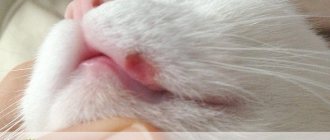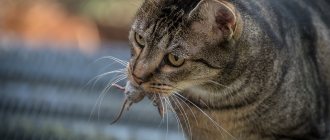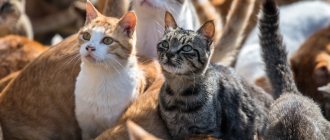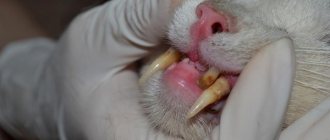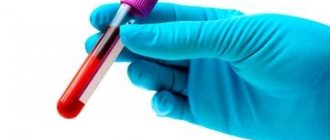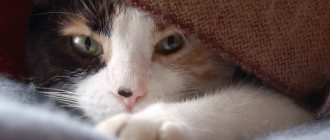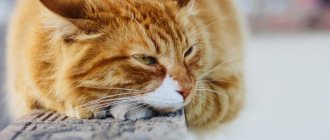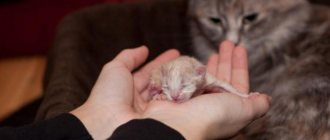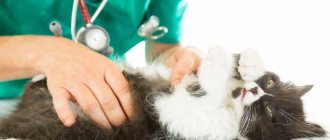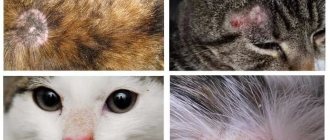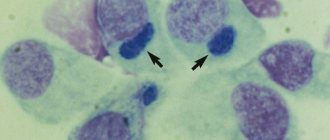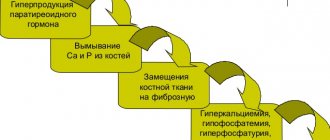The role of vitamins
Vitamins are an important element in a cat's diet. In the wild, predators obtain them mainly from the meat of prey, which they eat along with the skin, bones, feathers, if it is a bird. And a small but important part from plant foods. Partially in the form of the contents of the victim's stomach.
Pets can also get vitamins by eating their food. In expensive industrial mixtures, super premium or holistic, there are usually enough of them, these foods are balanced in composition.
With a natural diet, the cat most often does not have enough vitamins. The food that a person can offer to a pet does not contain all the elements necessary for the predator’s body. Then vitamin deficiency occurs. The animal becomes lethargic, apathetic, loses its external gloss and grooming, begins to limp, and coordination of movements is impaired.
At the same time, the body is susceptible to multiple diseases, quickly depleted, and does not have the necessary protection.
Each group of vitamins has its own functions:
- A - increases the body’s immune defense, stimulates cell renewal and growth, improves vision.
- B - responds to the proper functioning of the gastrointestinal tract, the condition of the coat and skin, and general activity.
- E is an antioxidant. The functioning of the reproductive system and the development of the fetus depend on it. Therefore, this vitamin is necessary primarily for pregnant females.
- D - necessary for the proper formation of the skeleton, joints and muscles.
- C - helps increase the elasticity of the walls of blood vessels, is responsible for the functioning of the heart muscle and joints.
- H - the condition of the cat’s skin and coat depends on it.
- K is necessary primarily to ensure blood clotting.
- Taurine is an essential amino acid that is most responsible for maintaining a cat's immune system and improving vision.
Causes of vitamin deficiency in cats
Not only good nutrition controls the correct ratio of vitamins in the cat’s body. Vitamin deficiency in a pet can develop for the following reasons:
- unhealthy diet with insufficient vitamin content;
- unsuccessful pregnancy, abnormal fetal development;
- difficult childbirth, lack of maternal feeding;
- chronic diseases of the gastrointestinal tract;
- consequences of past viral infections;
- reduced level of immune defense;
- long-term use of antibiotics and sulfonamide drugs;
- infection of a cat with helminths;
- pathologies of the endocrine and nervous system;
- prolonged stressful conditions;
- general low level of pet maintenance, poor quality care.
The difference between vitamin deficiency and hypovitaminosis
Vitamin deficiency in cats is often confused with a similar concept - hypovitaminosis. They differ in the severity of the condition. In the first case, there is a total lack of one or more elements, and in the second - a partial one.
Hypovitaminosis is a milder disease, accompanied by fatigue and frequent colds. It is always associated with poor nutrition and never occurs due to disruption of the digestive organs responsible for the absorption of vitamins.
How does vitamin deficiency manifest itself in cats?
The first sign of the disease is a decrease in general tone. Then the coat begins to lose its shine, becomes greasy in appearance and unkempt, and it may fall out and areas of baldness may appear. The animal strives for solitude, sleeps a lot, and loses its appetite. Sores and sores may appear on the skin, and itching begins. At first, the disease usually proceeds secretly, its clear signs appear in the second stage.
The lack of a particular vitamin is characterized by a certain symptom.
Vitamin A deficiency
The most painful effect of retinol deficiency is on kittens, both newborns and adolescents.
First of all, the mucous membrane of the eyes suffers, conjunctivitis develops, quickly turning into an acute form. The epithelium of the small intestine is damaged, which causes diarrhea.
An adult cat may develop “night blindness”, the effect of poor twilight vision, which is simply a disaster for a predator.
The condition of the skin and coat also deteriorates; they become dry, brittle, dull, and dermatitis appears. Females may develop infertility, stress and nervous disorders.
Lack of B vitamins
Biochemically, this group is responsible for many body functions, but primarily for the functioning of the nervous system.
Thiamine (B1) and riboflavin (B2) are responsible for the conduction of nerve impulses. In addition, with their deficiency, the functioning of the gastrointestinal tract deteriorates and hemoglobin drops. With a large deficiency, seizures, epilepsy and muscle paralysis may occur.
A deficiency of this group of vitamins is unacceptable for a pregnant female; this can lead to complications, difficult childbirth, postpartum hemorrhage and illness.
It is the lack of riboflavin that can cause the formation of sores and ulcers in the animal’s oral cavity.
Pyridoxine (B6) is largely responsible for the functioning of the musculoskeletal system, but not only. With its deficiency, arthritis, urolithiasis, stomatitis, gingivitis, and conjunctivitis develop. Lack of B12 leads to the progression of anemia, decreased blood clotting, decreased heart rate, and constipation.
Vitamin C deficiency
It is one of the main natural antioxidants. With its deficiency, the body's immune defense sharply decreases, which manifests itself in permanent stomatitis, gingivitis, periodontal disease, bleeding from the gums and even the loss of teeth by the cat. The elasticity of blood vessels decreases, joint diseases appear, and coordination of movements is impaired.
Vitamin D deficiency
Kittens primarily suffer from a lack of this vitamin. Due to improper development of bones and the entire skeleton as a whole, rickets progresses. Children also suffer from painful growth of joints, brittleness of bones, fractures and sprains, curvature of the spine, and diseases of the respiratory system.
Vitamin E deficiency
This is dangerous primarily for the intrauterine development of the fetus. Lack of tocopherol can also lead to infertility, difficult pregnancies and childbirths, miscarriages, and the birth of malformed and dead kittens. Vitamin deficiency type E contributes to the development of pancreatitis and disruption of the digestive system.
General signs of pathology may indicate not only vitamin deficiency; they are also characteristic of many other, more serious diseases. Only a thorough examination at a veterinary clinic will help establish an accurate diagnosis.
Grass for cats
In addition to the food provided to the cat by its owner, the cat itself can find sources of necessary vitamins, which are often grass. Absolutely everyone, both indoor and outdoor cats, eat grass. The thing is that grass contains a large amount of microelements and vitamins, which the animal often does not receive from homemade food. Therefore, you should not be surprised or sound the alarm if your cat suddenly shows interest in the plants standing on the windowsill. If you do not let your cat outside, make sure that the grass she needs is available in your home.
This is interesting: Analysis of Giardiasis in Dogs Allegria
To please your pet, purchase special seeds from the pet store that will allow you to grow the grass that cats love most at home. Most often this is ordinary wheat or oats. The grass should be fresh and juicy, and also firmly adhere to the ground with its roots, then it will be much more convenient for the cat to bite it. This cat grass remains usable for no more than a month, after which it begins to wither and ceases to interest the cat. Fresh grass is of particular importance for a cat’s health during the change of season, namely during an increased likelihood of vitamin deficiency.
Another benefit of the herb is its ability to cleanse the cat’s stomach and intestines. The fur and foreign objects that the cat swallows during the washing process are much easier to leave its body with the help of ordinary grass, absorbed by the cat in small quantities.
This vitamin is part of the complex of essential vitamins that a cat needs for normal life and development. With a lack of vitamin A, visible skin problems occur, weight loss is observed, growth retardation in small kittens, as well as damage to the mucous membrane of the eyes. Long-term vitamin A deficiency can even cause a cat to lose its ability to see in the dark. A lack of vitamin A can also negatively affect the reproductive function of a cat. In addition to special vitamin complexes, regular food products will help restore vitamin levels in the animal’s body. Introduce butter, egg yolk, and beef liver in small quantities into your cat's diet. As a preventive measure, you can add fish oil to your food. Vitamin A reserves must be replenished regularly, since it is not able to accumulate in the body.
Mr. Cat recommends: how to solve the problem
There is no systemic treatment for vitamin deficiency. The main thing here is to identify the problem in a timely manner and understand which groups of vitamins the pet lacks.
You should not give your cat vitamin-mineral complexes independently and uncontrollably. Excess vitamins can lead to smaller, and sometimes even bigger, problems.
It is important to properly adjust the animal’s diet. The veterinarian usually prescribes the use of complexes when the cat eats natural food, in which it is difficult to achieve the required content of the necessary elements.
If your pet is on dry formula, then you may need to switch to more expensive but high-quality food. For example, in the holistic class they are all balanced and no additional vitamin intake is required. This is Savarra, Monge, Grandorf.
If the problem has gone far and adjusting the diet does not solve it, then you will have to purchase special vitamin complexes. The table shows some of them.
| Name | Characteristic | Price, rubles |
| Excel Brewer's Yeast 260 tablets | B vitamins. Contains zinc, brewer's yeast, tuna fat. Appetite, coat and skin quality increase, and the functioning of the nervous and immune systems improves. | 455 |
| Beaphar Top 10 Cat 180 pieces | Multivitamin complex with taurine. A broad-spectrum drug that strengthens the immune system. Can be given to kittens. | 623 |
| Anivital Feli Immun 140 tablets | Vitamins C and E, iron, choline, folic acid. Broad-spectrum complex. | 1730 |
| Beaphar Kitty Mix 180 tablets | Vitamin and mineral complex with taurine, phosphorus, sodium, biotin, leucine, calcium. Strengthening the cardiovascular and immune systems. | 1391 |
| Canina Canivita 100 ml | Multivitamin complex (A, B, C, D, E). Reduces cholesterol, improves heart function, improves immunity, improves the quality of coat and skin. | 936 |
| Gimpet Multi-Vitamin Paste Extra 200 g | Multivitamin complex in paste form. | 640 |
| VetAminex 60 pieces | Multivitamins with zinc, calcium, phosphorus, folic acid. | 2000 |
| Radostin 90 pieces | Vitamin and mineral supplement. | 201 |
| Biorhythm for kittens (morning + evening) 24 doses | Vitamin and mineral complex with taurine, calcium, phosphorus, iodine, molybdenum, iron, zinc, selenium, copper. | 235 |
What foods help overcome vitamin deficiency in cats?
Using the table, you can determine which products can replenish the content of a particular vitamin in your pet’s natural diet.
| Name of vitamin | Products |
| A | Egg yolk, beef liver, butter, fish oil; raw meat, fish, cod liver. |
| B | Raw meat, heart, liver, kidneys, eggs, biokefirs and bioyogurts, carrots, zucchini, beets, greens, brewer's yeast, meat and bone meal. |
| C | Carrots, greens, pumpkin, turnips, spinach, pharmaceutical ascorbic acid without sugar. |
| D | Raw meat, eggs, dairy products, brewer's yeast, meat and bone meal. |
| E | Greens, sunflower and olive oils, sprouted grains (oats, wheat), fish oil. |
| H | Raw meat and liver, brewer's yeast. |
Vitamin preparations exist not only in the form of tablets and pastes, but also in injections. But all of them are prescribed strictly under the supervision of a veterinarian.
Many of them do not mix with each other. Vitamins B, C, U are water soluble. They stimulate metabolism and biological synthesis. A, D, E, K - fat-soluble, participate in all physiological processes in the body.
Panthenolic and folic acids, biotin, carotene are provitamins and are responsible for the condition of the skin, wool, bones, muscles and tendons.
With an excess of vitamin A, anaphylactic shock and general intoxication can develop. Hypervitaminosis B - severe allergic reactions to Quincke's edema, C - lead to diabetes.
Therefore, at the first signs of vitamin deficiency, you should immediately consult a veterinarian. Only a detailed blood test will show the true picture of the disease.
All specialist prescriptions must be carried out accurately, without exceeding dosages. During the treatment process, constant monitoring by a veterinarian with regular blood tests is necessary.
Treatment of vitamin deficiency
It is important for the health of the animal that it regularly takes sunbathing.
Veterinarians recommend starting treatment for vitamin deficiency with dietary adjustments. It is necessary to add foods that have the necessary biologically active substances to the diet. You should also consult with a veterinarian about treating your animal with pharmaceutical vitamin complexes in tablets. In addition, the cat owner must ensure that the pet receives a sufficient amount of sunbathing.
The table shows the foods that a cat needs to eat in order to get rid of the lack of one or another organic substance:
| Vitamins | Products |
| Retinol | Egg yolk |
| Cod liver | |
| Fish fat | |
| Group B | Meat |
| Cottage cheese | |
| Wheat groats | |
| Calciferol | Eggs |
| Dairy | |
| Fish | |
| Tocopherol | Vegetable oils |
| Greenery | |
| Bran | |
| Menadion | Milk |
| Sea fish | |
| Greenery | |
| Ascorbic acid | Carrot |
| Pumpkin | |
| Beef liver |
